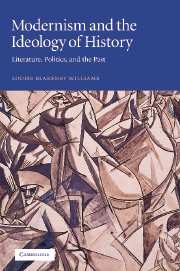Book contents
- Frontmatter
- Contents
- Acknowledgements
- Abbreviations
- Introduction
- 1 “Immaterial pleasure houses”: the initial aesthetic dilemma
- 2 “A more dream-heavy hour”: medievalist and progressive beginnings
- 3 “Pedantry and hysteria”: contemporary political problems
- 4 “A certain discipline”: radical conservative solutions
- 5 “A particularly lively wheel”: cyclic views emerge
- 6 “Our own image”: the example of Asian and non-Western cultures
- 7 In “the grip of the … vortex”: the proof of Post-Impressionist art
- 8 The “cycle dance”: cyclic history arrives
- 9 “The Nightmare” and beyond: the First World War and mature cyclic theories
- Conclusion
- Notes
- Index
1 - “Immaterial pleasure houses”: the initial aesthetic dilemma
Published online by Cambridge University Press: 22 September 2009
- Frontmatter
- Contents
- Acknowledgements
- Abbreviations
- Introduction
- 1 “Immaterial pleasure houses”: the initial aesthetic dilemma
- 2 “A more dream-heavy hour”: medievalist and progressive beginnings
- 3 “Pedantry and hysteria”: contemporary political problems
- 4 “A certain discipline”: radical conservative solutions
- 5 “A particularly lively wheel”: cyclic views emerge
- 6 “Our own image”: the example of Asian and non-Western cultures
- 7 In “the grip of the … vortex”: the proof of Post-Impressionist art
- 8 The “cycle dance”: cyclic history arrives
- 9 “The Nightmare” and beyond: the First World War and mature cyclic theories
- Conclusion
- Notes
- Index
Summary
When we look back upon the lives of our fathers the first thing that seems to strike us is their intolerable slowness, and then the gloom in which they lived – or perhaps the gloom would strike us first. … I do not believe they had sunlight. … I do not believe they had any fresh breezes. … They could not have had. It was always brown, motionless fog in those days. … But in gloom and amidst horror they sang on bravely … in amidst the glooms they built immaterial pleasure houses.
Ford Madox Ford, Ancient Lights, 1911According to Ford Madox Ford, one of his very first memories was of lying in his cradle surrounded by proofsheets of the poems of Dante Gabriel Rossetti. Although this undoubtedly is an example of Ford's legendary, and often self-serving imagination, it was not beyond the realm of possibility. Much of Ford's youth was spent at the home of his grandfather, the famous Pre-Raphaelite painter, Ford Madox Brown, in the company of his cousins who were Rossetti's nieces and nephew. Ford's early years, therefore, were lived in the shadow of the great figures of the Victorian art world. And despite his deep love for his grandfather, Ford's recollection of these artists, as the quote heading this chapter indicates, was often of the depression, gloom, and inadequacy he felt in their presence. Early on he wished to escape from their influence.
- Type
- Chapter
- Information
- Modernism and the Ideology of HistoryLiterature, Politics, and the Past, pp. 21 - 38Publisher: Cambridge University PressPrint publication year: 2002



